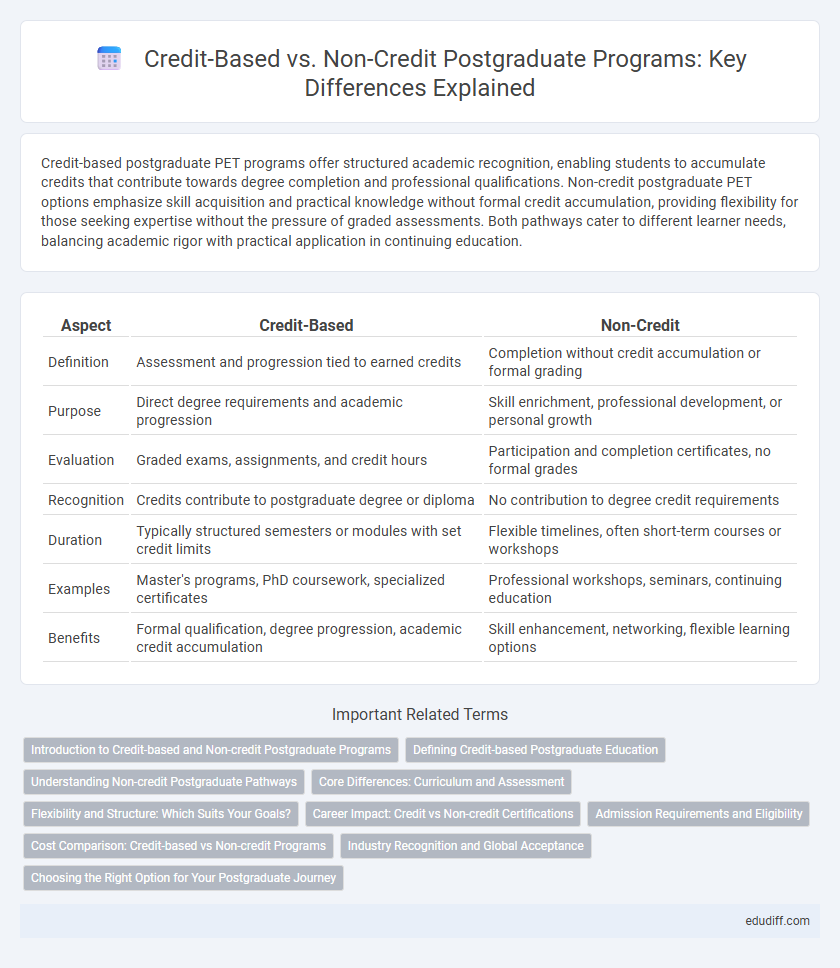Credit-based postgraduate PET programs offer structured academic recognition, enabling students to accumulate credits that contribute towards degree completion and professional qualifications. Non-credit postgraduate PET options emphasize skill acquisition and practical knowledge without formal credit accumulation, providing flexibility for those seeking expertise without the pressure of graded assessments. Both pathways cater to different learner needs, balancing academic rigor with practical application in continuing education.
Table of Comparison
| Aspect | Credit-Based | Non-Credit |
|---|---|---|
| Definition | Assessment and progression tied to earned credits | Completion without credit accumulation or formal grading |
| Purpose | Direct degree requirements and academic progression | Skill enrichment, professional development, or personal growth |
| Evaluation | Graded exams, assignments, and credit hours | Participation and completion certificates, no formal grades |
| Recognition | Credits contribute to postgraduate degree or diploma | No contribution to degree credit requirements |
| Duration | Typically structured semesters or modules with set credit limits | Flexible timelines, often short-term courses or workshops |
| Examples | Master's programs, PhD coursework, specialized certificates | Professional workshops, seminars, continuing education |
| Benefits | Formal qualification, degree progression, academic credit accumulation | Skill enhancement, networking, flexible learning options |
Introduction to Credit-based and Non-credit Postgraduate Programs
Credit-based postgraduate programs assign specific credit values to each course, requiring students to accumulate a predetermined number of credits for graduation. Non-credit postgraduate programs focus on skill development and knowledge acquisition without the obligation of credit accumulation or formal grading. Understanding the distinction helps prospective students select the appropriate structure for their academic and professional goals.
Defining Credit-based Postgraduate Education
Credit-based postgraduate education structures learning into quantifiable units, typically measured in credits that correspond to estimated student workload hours. Each credit represents a portion of the curriculum, allowing flexible accumulation and transferability across institutions, ultimately facilitating degree completion verification. This system enhances transparency, standardization, and comparability of postgraduate qualifications globally.
Understanding Non-credit Postgraduate Pathways
Non-credit postgraduate pathways provide flexible learning opportunities without the pressure of formal assessment or credit accumulation, ideal for professional development and skill enhancement. These programs often include workshops, seminars, and certificate courses tailored to specific industry needs, allowing learners to gain targeted knowledge rapidly. Unlike credit-based courses, non-credit options do not contribute to a degree but enhance expertise and career prospects through practical, focused education.
Core Differences: Curriculum and Assessment
Credit-based postgraduate programs assign specific credit values to each course, contributing to the total credits required for graduation, with assessments including exams, projects, and continuous evaluations to measure competency. Non-credit postgraduate programs do not allocate credits but focus on knowledge acquisition through comprehensive lectures, seminars, and practical sessions, often assessing learners via participation and final presentations without formal grading. The curriculum in credit-based programs is structured and modular, while non-credit programs offer flexible content tailored to professional development and skill enhancement.
Flexibility and Structure: Which Suits Your Goals?
Credit-based postgraduate programs offer a structured curriculum with defined credit requirements, ideal for students seeking clear academic milestones and potential credit transferability. Non-credit programs provide greater flexibility by allowing learners to focus on specific skills or knowledge without the pressure of accumulating credits, making them suitable for professional development or personal enrichment. Choosing between the two depends on whether you prioritize formal recognition and progression or adaptable learning pace and customized content.
Career Impact: Credit vs Non-credit Certifications
Credit-based postgraduate programs often provide formal recognition that can enhance career advancement by contributing to degree qualifications and professional licensure requirements. Non-credit certifications offer specialized skills and knowledge that boost employability and job performance but may not directly influence academic credentials. Employers increasingly value both types, with credit-based qualifications signaling academic rigor and non-credit certifications demonstrating practical expertise and ongoing professional development.
Admission Requirements and Eligibility
Credit-based postgraduate programs typically require applicants to have completed a relevant undergraduate degree with a minimum GPA, along with prerequisite coursework aligned to the field of study. Non-credit postgraduate courses often have more flexible admission requirements, sometimes allowing professional experience or prior certifications in lieu of formal academic qualifications. Eligibility for credit-based programs usually leads to degree or diploma certifications, whereas non-credit programs focus on skill enhancement or professional development without academic credit accumulation.
Cost Comparison: Credit-based vs Non-credit Programs
Credit-based postgraduate programs typically incur higher tuition fees due to structured curricula and accreditation requirements, while non-credit programs often offer lower costs but lack formal recognition. Non-credit options provide flexible learning opportunities at reduced prices, appealing to professionals seeking skill enhancement without the financial commitment of full credit courses. Cost efficiency varies significantly between institutions, making it essential to evaluate program value relative to long-term career benefits.
Industry Recognition and Global Acceptance
Credit-based postgraduate programs offer structured coursework and are widely recognized by industry sectors and academic institutions globally, facilitating career advancement and further studies. Non-credit programs, while often focused on skill enhancement and practical knowledge, may lack formal recognition but provide flexibility and targeted learning for professionals seeking specific industry competencies. Employers and universities tend to prefer credit-based qualifications for their standardized assessment and transferability across borders.
Choosing the Right Option for Your Postgraduate Journey
Selecting between credit-based and non-credit postgraduate programs hinges on your academic and career goals, with credit-based courses offering recognized qualifications that can lead to further study or professional certification. Non-credit programs provide flexibility and skill development without the pressure of grades, ideal for personal enrichment or skill-specific training. Evaluating your long-term ambitions and the value of formal accreditation will help determine the most suitable pathway for your postgraduate advancement.
Credit-based vs Non-credit Infographic

 edudiff.com
edudiff.com